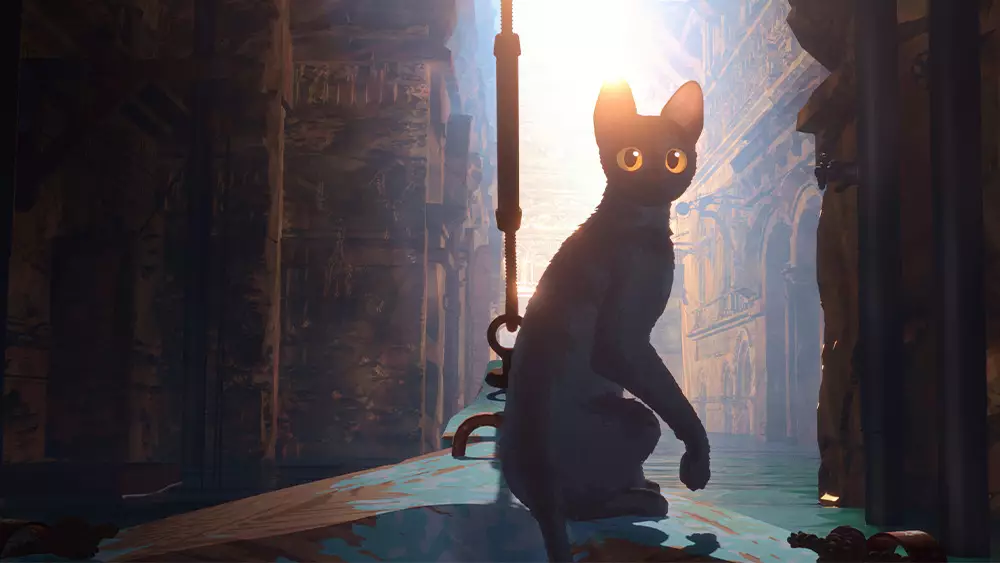In a cinematic landscape often dominated by blockbuster franchises, the recent debut of *Flow* has taken both critics and audiences by surprise. The animated feature, produced by Sideshow and Janus Films, launched on a modest two screens but achieved an astonishing per-screen average of approximately $25,400. This figure rises to an impressive $50,800 when considering its double-header opening in major markets like New York and Los Angeles. Directed by Gints Zilbalodis, *Flow* has emerged as Latvia’s submission for the upcoming Oscar race, highlighting the potential of foreign animated films to resonate with a global audience.
What distinguishes *Flow* is not merely its financial success but its content—a poignant narrative centered on a courageous cat who navigates the challenges of life following a devastating flood. The film’s success at the Angelika Theater in New York—where it was the top-grossing film—and its strong performance at the AMC Burbank in Los Angeles, where it positioned itself just behind major releases like *Gladiator 2* and *Wicked*, underscores the film’s appeal across different demographics. Families looking for animated fare and fans of Studio Ghibli films flocked to these screenings, sparking sellouts that reflected an organic grassroots enthusiasm.
*Flow* not only resonates with audiences but also garners favorable critiques, holding a remarkable 98% approval rating on Rotten Tomatoes. This level of acclaim has ignited speculation regarding its potential nominations for prestigious awards, particularly within the Best Animated Feature category at the Oscars. Moreover, there is a distinct historical context at play, as *Flow* could become the first Latvian film ever nominated for the Best International Feature category, further highlighting the film’s significance.
The buzz around *Flow* also ties seamlessly into the marketing strategies of Sideshow/Janus Films, which plans to expand its theatrical reach significantly by December 6. By targeting a blend of upscale chain theaters and select independent art houses, the distributor cleverly positions *Flow* to attract audiences who may also be attending other family-friendly films, such as *Moana 2*. This strategic approach is reminiscent of past successes such as *Drive My Car* and *EO*, indicating a clear pattern of distributing meaningful cinema in a manner that circumvents traditional competition.
On the same cinematic weekend, other notable films made their presence felt. For instance, *A Traveler’s Needs*, directed by Hong Sangsoo and featuring the acclaimed Isabelle Huppert, opened to an estimated $18,000 weekend across two theaters in New York. This film exemplifies the power of compelling stories told through unique perspectives, further enriching the theatrical landscape.
Against this backdrop, Sandi DuBowski’s *Sabbath Queen*, a documentary chronicling the journey of a radical drag queen who transforms into a rabbi, is also making waves. Projected to gross around $17,500 at the IFC Center in New York, *Sabbath Queen* has achieved multiple sold-out screenings and audience engagement events, showcasing a model for documentaries that thrive on interactivity and connection with viewers. It is noteworthy how films like these reflect broader social themes and resonate with diverse audiences seeking authenticity in storytelling.
Yet, while *Flow* and these documentaries showcase promising performances, they exist in a competitive landscape heavily overshadowed by mammoth productions like *Wicked* and *Gladiator 2*. In this context, the indie film *Bonhoffer: Pastor. Spy. Assassin* has made a splash, opening at fourth place with $5.1 million, while A24’s *Heretic* and Searchlight Pictures’ *A Real Pain* show resilience despite their lower positions in the box office rankings.
Ultimately, the emergence of *Flow* alongside these other independent films serves as a vibrant reminder of the diverse voices and stories attempting to carve out their space within a franchise-oriented market. This trend signals a growing appetite for unique narratives, compelling character arcs, and thought-provoking themes, suggesting that the cinematic landscape may be shifting toward a more inclusive and varied storytelling schema. As audiences continue to embrace these films, the future of cinema appears bright, albeit challenging, for independent artists seeking to make their mark.
